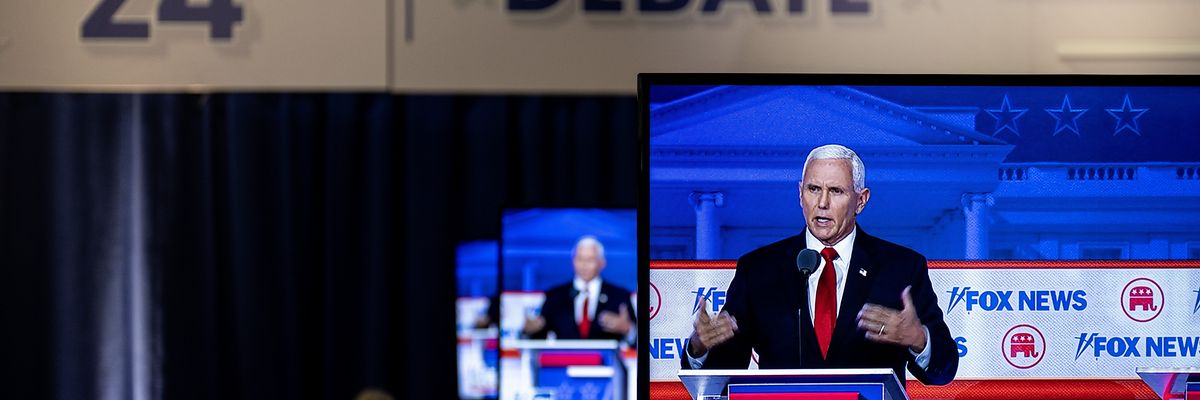Concerns about foreign governments seeking influence over U.S. foreign policy are seemingly in headlines every day.
President Joe Biden’s son, Hunter Biden, earned millions in fees from Chinese partners between 2013 and 2018; Brookings Institution President Ret. Gen. John R. Allen resigned after being accused of secretly lobbying for Qatar (no criminal charges were brought); and a cloud of suspicion that Donald Trump was influenced by foreign interests in Russia, the United Arab Emirates and Israel, among other countries, hung over his presidency, even after the Mueller investigation failed to provide conclusive evidence that Trump’s campaign criminally conspired with Russian officials in the 2016 election campaign.
But some of the candidates in the Republican presidential primary field appear to have few if any concerns about collecting six-or seven-figure paydays from foreign sources, according to a review of the candidates’ financial disclosures.
Unsurprisingly, Donald Trump tops both the polls and as recipient of foreign money, taking between $2 million and $10 million from his companies in the United Arab Emirates, over $5 million from his company in Oman, among other foreign payments totaling well in excess of $25 million and potentially exceeding $50 million. He also received at least $2 million in speaking fees at events connected to the Unification Church, a South Korean evangelical congregation with politically far-right leanings that also owns the conservative Washington Times. Former Vice President Mike Pence also collected $550,000 in speaking fees from a group founded by the late Rev. Sun Myung Moon – who founded the Unification Church.
Pence’s biggest foreign payments came from groups associated with Mojahedin-e Khalq (MEK). This Iranian militant group spent time on the State Department’s list of foreign terrorist organizations from 1997 to 2012 due to its role in the killing of six Americans in Iran in the 1970s and an attempted attack against the Iranian mission to the UN in 1992.
Following the 1979 Iranian revolution, the group fell out with the Islamic Republic and fled to Iraq, from which it fought alongside Saddam Hussein’s army during the Iran-Iraq war.
During the U.S. occupation of Iraq, Human Rights Watch and the Rand Corporation reported on human rights abuses conducted by the MEK against its own members. The MEK had become increasingly insular, focused on the aggrandizement of its late-leader Masoud Rajavi and his wife, Maryam Rajavi, leading outside observers, including the Rand Corporation, to characterize it as a “cult.”
Since its delisting as a terrorist organization in 2012 the group worked to rehabilitate its image by featuring high-profile politicians at its conventions, including Senate Foreign Relations Committee Chairman Robert Menendez (D-N.J.), former Secretary of State Mike Pompeo, former Democratic National Committee Chairwoman Donna Brazile, and former defense official and WestExec and Center for a New American Security co-founder Michèle Flournoy, seeking to frame themselves as a legitimate dissident group and a viable political force in Iran if the Islamic Republic undergoes regime change.
Those appearances were often incentivized by lucrative speaker fees, a trend underscored in the former vice president’s finances. Pence has received $430,000 from three groups affiliated with the MEK.
Former South Carolina governor and former U.S. ambassador to the UN Nikki Haley reported between $50,000 and $100,000 from United Against Nuclear Iran (UANI), a New York-based pressure group that opposed the legal sale of medical supplies to Iran early in the COVID-19 pandemic and regularly calls for for heightened sanctions against Iran and against diplomatic efforts to constrain Iran’s nuclear program.
It’s possible those donations are linked to foreign governments as UANI and its affiliated organizations have a number of links to Gulf monarchies. Emails that appear to have originated from the United Arab Emirates’ ambassador in Washington, Yousef Al Otaiba, exposed a UANI advisory board member soliciting “support” from the UAE. In another email, Republican Party fundraiser and Saudi lobbyist Norm Coleman provided the tax status of UANI’s umbrella group to Otaiba — suggesting a donation from the UAE was forthcoming — and offered to answer any questions from the ambassador.
Haley also collected between $100,000 and $1,000,000 each from Canadian Friends of the Jerusalem College of Technology, Barclays Capital Asia, and the Centre for Israel and Jewish Affairs.
Pence and Haley’s financial disclosures show a clear trend: foreign-linked groups with an interest in a hawkish U.S. role in the Middle East and regime change in Iran have taken a particular interest in funneling payments to these two candidates. Whether these were one-off payments for speaking appearances or down payments on influencing U.S. foreign policy remains to be clarified.
















